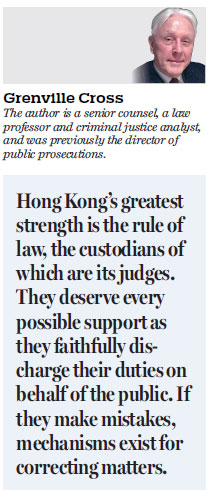HK judiciary independent, just, upholds rule of law
Updated: 2018-09-13 05:54
(HK Edition)
|
|||||||||
Grenville Cross points out that SAR judges take an oath to uphold the Basic Law; scurrilous, defamatory accusations against them are unacceptable
Judges are not holy cows. When they take decisions which people dislike, they may face criticism. After all, in a free society people can comment on legal issues, just as they do upon social or political issues.
However, comment should be informed. Ignorant criticism of judicial decisions does not advance the rule of law, and can engender disrespect for the judiciary, which is bad for the legal system. To avoid such situations, the judges are always required to provide reasoned judgments, setting out clearly their thought processes, for the benefit of the parties and the public.

When appointed, judges take a judicial oath. They swear to uphold the Basic Law and to serve Hong Kong conscientiously, dutifully, in full accordance with the law and with integrity, safeguard the law and administer justice without fear or favor, self-interest or deceit. This is, or should be, profoundly reassuring to everyone involved in litigation, as it means that judges act independently and in accordance with legal principle.
The judges, moreover, under the Basic Law, are selected on the basis of their judicial and professional qualities. This means that great care is taken in ensuring that only people of the right quality are ever given a mandate to adjudicate on cases. Once appointed, the constitutional duty of a judge is to decide cases independently, and to apply the law to the issues engaged.
It is sometimes said that justice is blind. This means quite simply that when judges decide cases they do so without prejudice, and that their sole objective is a just outcome based on the law. Hong Kong's judiciary is committed to this model, which helps to explain its high standing, both locally and internationally.
In January, the chief justice, Geoffrey Ma Tao-li, explained that it is not part of the judges' duty "to adjudicate on political, economic or social issues without reference to the law". He then crucially added that "political or other affiliations or biases are simply not relevant at all, whether in favor of or detrimental to the person involved".
Of course, some people will sometimes dislike judicial decisions, and this is inevitable. However, there must always be respect for judges acting in good faith. There can, in particular, be no justification for abuse of judges, let alone for defamatory condemnations.
After the Court of Final Appeal recently set aside the sentences of imprisonment imposed on 13 protesters involved in a violent demonstration, a local politician denounced the judges in inflammatory terms. He called them "sinners against society", and worse. What was extraordinary, however, was that the individual concerned made his remarks without even having read the judgment, as the court said it would issue its reasons at a later date. This, of course, was the height of irresponsibility, and may yet attract consequences.
Throughout the common law world, including Hong Kong, judges can remedy matters when the court is scandalized, and impose sanctions. This is a type of contempt of court, and it arises when judges are defamed in a way which is likely to undermine the administration of justice or public confidence therein. Scurrilous abuse of judges calculated to bring a court into contempt or to lower its standing or authority quite clearly cannot be tolerated in a civilized society. The authorities will now need to review exactly what was said in this case, and see whether, as seems likely, it has exceeded the limits of legitimate comment.
Hong Kong's greatest strength is the rule of law, the custodians of which are its judges. They deserve every possible support as they faithfully discharge their duties on behalf of the public. If they make mistakes, mechanisms exist for correcting matters. However, even when people dislike their judgments they must still show basic respect, not least because disrespect has the potential to damage the legal system.
(HK Edition 09/13/2018 page7)